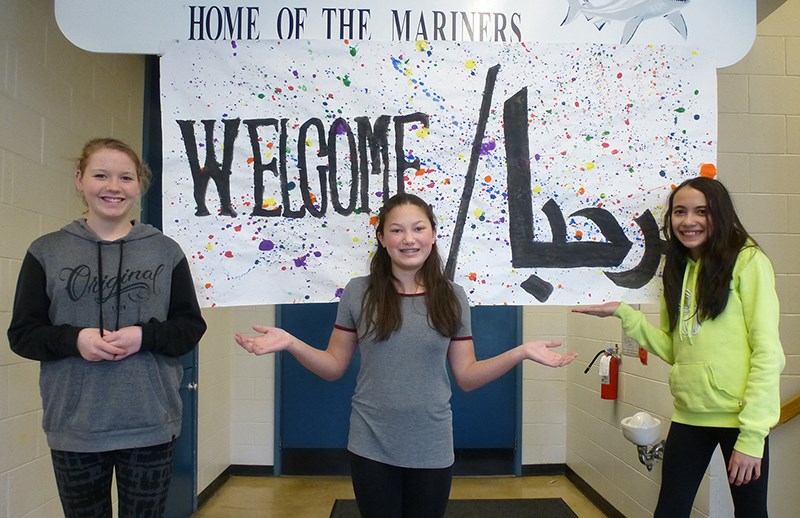Long awaited, often talked about, Syrian refugees are about to move into the Tri-Cities, and local schools and community agencies are set to welcome them.
As many as 18 families of government-assisted refugees (GAR) will be moving into the Cottonwood neighbourhood off North Road in the next week, with more to come as soon as low-cost housing can be found.
These are the first GAR families to arrive in B.C. through the federal government's commitment of resettling 25,000 Syrian refugees through a five-phase national plan, said Chris Friesen, settlement director with the Immigration Services Society. He said the province is set to accept 1,959 refugees by March 1, more than double the number who usually arrive in B.C. on annually.
"This has really ramped up really fast," he told The Tri-City News. "We brought in a team of permanent housing search workers. We've got five and are hiring two more. Their only job is securing permanent housing."
So far, 679 refugees have arrived in B.C., many of them children, and more are arriving every day. They are currently housed in six temporary reception centres in the Lower Mainland awaiting more permanent housing, and Friesen says ISS is still looking for housing leads and recently found space for 18 families in Coquitlam.
The units are in apartments located at 550 Cottonwood and will be available for a year at income assistance (welfare) rates, giving newcomers a stable place to re-start their lives after a tumultuous escape from war-torn Syria.
"Coquitlam is going to be the largest initial community that will welcome the largest number of Syrian government assisted refugees for this current operation," said Friesen, who said the community has ramped up services to make sure there are schools and other family resources to handle the influx.
STUDENTS ARRIVING
Indeed, School District 43's ability to accommodate school-aged refugee children was a major topic at Tuesday's board of education meeting.
Trustees were told that as many as 100 government-assisted Syrian refugees may be arriving in schools, in addition to approximately 20 or more who are sponsored by families, churches and community groups.
The new arrivals will first attend a welcome centre at Montgomery middle school. (That's where family of members of Tima Kurdi are in a classroom with a teacher and the support of a case worker with the federally-funded Settlement Workers in Schools program.)
After settling in, the students will be assessed and, when ready, will then move to their local schools. In situations where there isn't room at their neighbourhood school, space will be found at the next closest school.
Among the schools expected to take the refugees are those clustered in Coquitlam's western neighbourhoods, with older students destined for Centennial secondary, where they will be able to take academic courses and electives, and learn English.
SCHOOLS WELCOME
Montgomery middle school in central Coquitlam has the space for a welcome centre to accommodate the students, and staff and students have been welcoming, assistant superintendent Reno Ciolfi told trustees. Next door at Montgomery Centre, adult relatives of the Tri-Cities' newest students will be able to take English classes.
"We are confident our schools can adapt quite quickly," Ciolfi said.
And kids are getting in on the act.
To make the Syrian children feel welcome a group of Grade 8 students at Montgomery middle made a welcome sign in English and Arabic.
"We want to make them feel at home in their home language," student Ocean Clarke said.
FAMILY RESOURCES
Coquitlam is no stranger to accepting and welcoming refugees. As one of Metro Vancouver's top reception areas, it has a well-developed settlement network for the newcomers.
In SD43, for example, there are 233 refugee students enrolled in kindergarten to Grade 12, with 30 to 40 arriving each year. Summer programming and other community resources are made available to the children.
Fraser Health will also be working with the newcomers, who will have already had dental and health screening done at mobile clinics through ISS. As well, some of the refugees will get mental assessments, Friesen said, noting that the refugees arriving are among the most vulnerable, with health issues and disabilities, including blindness.
Children will also receive hearing and eye tests, and will be immunized before they move into their home communities.
"We have created a lot of community partners," Friesen said, adding that ISS will ramp up services at its Coquitlam offices as the need arises.
The refugees, who will be living on income assistance, are also expected to use the food bank, said Sylvia Ceacero, who took over as CEO of Share Family and Community Services on Jan. 4.
Families with children under five can also attend Share's New Beginnings program for refugees and visit resource centres in Coquitlam and Port Moody for programs. As well, Share offers programs for practising English language skills that will be helpful for refugees and some counselling may be available depending on the circumstances.
"We look forward to helping them, like with their predecessors, to join the community and feel part of it," Ceacero said.



